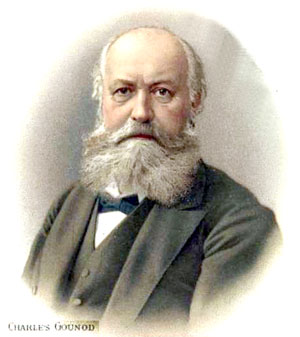June 11, 2018. Gounod at 200. Charles Gounod was born on June 18th of 1818 in Paris. Though we know him as an opera composer who influenced George Bizet, Jules Massenet and Camille Saint-Saëns, the young Gounod started with writing church music. After graduating from  the Paris Conservatory, where he took classes from Fromental Halévy and winning the Prix de Rome, he spent time in Italy studying the music of Palestrina. There he composed a Mass and a Requiem; upon returning to Paris he enrolled in a seminary. In 1848, though, he pivoted and got involved with opera. He was friends with the famous mezzo Pauline Viardot, one of the most respected singers of her time; through her he got a commission from the Paris Opéra. It was quite a coup for an unknown composer. (Viardot lived a long life: she died in 1910 at the age of 88. Very popular, she knew practically “everybody” worth knowing – composers, writers, painters. She had famous lovers, including the Russian novelist Ivan Turgenev, who eventually settled in the Viardo household. Pauline had a sister, Maria Malibran, also a singer and one of the greatest mezzos of the 19th century at that. Malbran’s voice range stretched from contralto to high soprano. She excelled in the operas of Rossini, Bellini and Donizetti. Malibran’s life was much shorter: she fell from a horse and died at the age of 28).
the Paris Conservatory, where he took classes from Fromental Halévy and winning the Prix de Rome, he spent time in Italy studying the music of Palestrina. There he composed a Mass and a Requiem; upon returning to Paris he enrolled in a seminary. In 1848, though, he pivoted and got involved with opera. He was friends with the famous mezzo Pauline Viardot, one of the most respected singers of her time; through her he got a commission from the Paris Opéra. It was quite a coup for an unknown composer. (Viardot lived a long life: she died in 1910 at the age of 88. Very popular, she knew practically “everybody” worth knowing – composers, writers, painters. She had famous lovers, including the Russian novelist Ivan Turgenev, who eventually settled in the Viardo household. Pauline had a sister, Maria Malibran, also a singer and one of the greatest mezzos of the 19th century at that. Malbran’s voice range stretched from contralto to high soprano. She excelled in the operas of Rossini, Bellini and Donizetti. Malibran’s life was much shorter: she fell from a horse and died at the age of 28).
Gounod’ first opera, titled Sapho was premiered in April of 1851. It failed with the public but gained some critical success, enough for the Opéra management to give Gounod another commission, the opera La nonne sanglante (The Bloody Nun). That one was also a failure, even though the libretto was written by the very popular Eugène Scribe. Four years later, in 1858, Gounod wrote a comic opera Le médecin malgré lui (The Doctor in spite of himself) based on a farce by Molière. It was yet another flop. Surprisingly, despite these financial disasters, opera directors were still ready to stage Gounod’s operas. In 1856 Jules Barbier and Michel Carré presented Gounod with a libretto called “Faust.” It was based on Carré's play Faust et Marguerite which in turn was loosely based on Goethe’s Faust, Part I. Léon Carvalho, the director of the Théâtre Lyrique, agreed to produce it. After a significant postponement, Faust was premiered in March of 1859. The opera wasn’t very successful, but neither was it a failure; the Théâtre Lyrique didn’t drop it and eventually the public reaction turned quite positive. After Gounod added a ballet intermission, it was staged at the Opéra to great success, and it eventually became the Paris Opéra’s most popular production. One of the greatest Méphistophélès of all time was the Russian bass Feodor Chapiapin. Here’s a recording of the famous “couplets” (Song of the Golden Calf) from Act I. It was made in 1928-1930. And here’s the finale of a wonderful 1958 recording, with Nicolai Gedda singing Faust, Victoria de los Ángeles as Marguerite and Boris Christoff as Méphistophèles. André Cluytens conducts the Orchester and the Chorus of the Théâtre National de l’Opéra.
In 1866 Gounod wrote one more opera that could be considered successful, Roméo et Juliette. It was very well received at the premiere, but eventually faded. His other operas – after Faust he wrote seven more, not counting Roméo et Juliette – fared much worse. In 1884 he stopped actively composing. Gounod died in 1893; he was given a state funeral which took place at the Church of the Madeleine (“The immense crowd filled the Place de la Madeleine” wrote the New York Times the next day). Adelina Patti, “the finest singer who ever lived” according to Giuseppe Verdi, presented an enormous bouquet at the service. Camille Saint-Saëns played the organ and Gabriel Fauré conducted the orchestra.
| Source: | https://www.classicalconnect.com/node/12587 |
| Website: | Classical Connect |